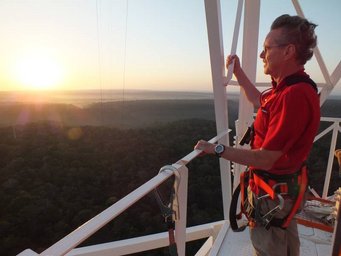Farewell symposium for world-renowned climate researcher
Meinrat O. Andreae, the Director of the Max Planck Institute for Chemistry in Mainz, is retiring
After 30 years as Director of the Biogeochemistry Department at the Max Planck Institute for Chemistry in Mainz and dedicating his entire life to science, Meinrat O. Andreae will officially retire on Friday, May 19, 2017, with the symposium entitled “Facets of Biogeochemistry – Farewell Meinrat ‘Andi’ Andreae”. Around 200 participants are expected to attend the symposium, where seven renowned international speakers will give an overview of the research that connects them with Meinrat O. Andreae, the climate researcher born in Augsburg.

Each presentation will shed light on part of the contribution that Meinrat O. Andreae has made, sometimes in cooperation with colleagues from across science, to our better understanding of the connections between the biosphere, the atmosphere and the oceans, and their importance for the climate here on Earth.
From the ocean to the Amazon rainforest
Over the years, Andreae’s research interests have evolved from geochemistry and chemical oceanography to biogeochemistry and atmospheric chemistry, with particular focuses on the sulfur cycle, the interactions between chemical processes and the climate, and the significance of vegetation fires.
He had a massive breakthrough at the end of the 1980s, when, while working together with Robert Charlson, James Lovelock and Steve Warren, he made a decisive contribution to explaining the role that algae play in the formation of dimethyl sulphide (DMS), which affects cloud formation and thus the climate (the “CLAW hypothesis”). Up until then, aerosols had had been neglected in attempts to explain climate change – but nowadays even microparticles are an integral part of climate research.
Honors and extensive commitment
Meinrat O. Andreae received numerous honors and awards during the course of his scientific career. In 2010 alone, he was recognized with four separate honors. In January of that year, the Johannes Gutenberg University of Mainz made him an honorary professor at the Institute of Geosciences. Shortly before that, he had already been appointed to the role of fellow at the prestigious American Association for the Advancement of Science. Ghent University awarded him an honorary doctorate in March and, finally, the International Aerosol Research Association awarded him the Fissan-Pui Prize too.
In 2013, he was appointed an honorary member of the renowned Academy of Arts and Sciences in the United States. To date, he has worked together with many scientific institutes all over the world, and is involved in teaching and in various steering committees for international large-scale research projects. To name but one example, he is a co-author of the Fourth Assessment Report of the Intergovernmental Panel on Climate Change. The work of the Intergovernmental Panel on Climate Change, known as the IPCC for short, was awarded the Nobel Peace Prize in 2007.
Meinrat O. Andreae has published around 500 scientific articles to date (as of January 2017, source: Papers in ISI Thomson ResearcherID Index) and several books.
Following his retirement from the MPI, Andreae will remain in his other posts as a professor emeritus in Mainz and as a scientist at the Scripps Institution of Oceanography at UC San Diego.
